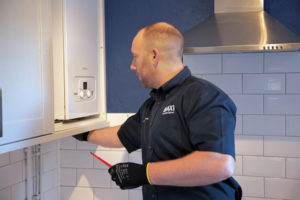New build housing developers will soon face a number of low-carbon heating and hot water system design, specification and skill challenges. Tom Murray, Specification Director Commercial and Residential at Baxi Heating, explains what this means, in addition to how developers can meet requirements with confidence.
When first considering the future of heat, developers need to be aware of The Future Homes Standard, which seeks to reduce the carbon footprint of new build homes by ending the use of gas heating systems in all new build houses from 2025. In addition, the recent review of Approved Document L (conservation of fuel and power) and F (ventilation) for new dwellings should come into force towards the end of 2021.
SAP 10.2 will also come into effect as the revised compliance calculation methodology underpinning Building Regulations, meaning carbon factors for electricity will be changing and dwelling emission targets will be tighter, as a step towards the outlined 2025 ambition.
For new build developers, what this means is considerable change is coming. Without being able to rely solely on gas heating options, developers will need to instead investigate electric-based technology like air source heat pumps (ASHP) and other direct forms of electric heating, such as electric boilers. SAP amendments will also require a careful approach to ensure a cost-effective specification where possible, while still meeting more stringent requirements. This is where Baxi Assure is well-positioned to provide a full spectrum of low-carbon heating technologies, design, specification and SAP assessment support, together with useful system add-ons to boost efficiencies such as flue gas heat recovery and smart, easy-to-use comfort controls.
 Heat pumps
Heat pumps
In terms of the low carbon alternatives, ASHPs feature heavily when discussing how low-carbon heat will be delivered for homes built to the Future Homes Standard. The primary reason for this being ASHP’s offer a relatively cost-effective solution in comparison to other options that will be available and can be included within new house designs fairly simply.
For housebuilders used to working with compact gas boilers, homes with ASHPs will require more space and design planning. This not only includes space outside for the ASHP with adequate free flow air around it, but also for the accompanying hot water cylinder inside the home. With this in mind, and the fact that ASHP are a relatively new technology in the UK, there will be a period of acclimation required and a solid effort across the supply chain to deliver quality installations.
ASHPs aren’t currently specified or installed in great numbers and there is room for error, which could cause housebuilders losses in time and money to rectify. Issues with design, installation and commissioning can all contribute to potential problems. To help combat this, indemnified Baxi Assure Design services can support the accurate design and specification of all Baxi Assure heating and hot water products including ASHP’s. Not only this, but bespoke Baxi Assure Training services are also provided on-site to educate contractors across the full product range.
Housebuilders will also need to consider that ASHP user education will be important. The majority of end-users will be used to boilers and in order to better sell new build homes, developers should provide information with the help of manufacturers. Baxi Assure, for example, is creating a homeowner guide to support developers with appropriate post-sales and customer after care support.
Direct electric heating options, such as electric boilers could also be considered for smaller well-insulated multiple occupancy and residential flats where it is advantageous for landlords to reduce installation and maintenance time. There is also the possibility that future fuels, such as hydrogen, could be introduced into the low-carbon heating mix. At the moment, the policy discussion surrounding the potential Future Home Standard precludes new build developments from connecting to the gas grid, which may mean that hydrogen is not a viable option, but the enacting regulations are not yet developed so this could change.
 One solution
One solution
The ever-changing housing landscape presents a real challenge which housebuilders will be looking to navigate as simply as possible. To help meet these anticipated changes, Baxi Assure, a new comprehensive residential specification range of products and services, has recently been launched to provide guidance and support on this journey.
Baxi Assure has listened to developer feedback and created a complete home service to ensure this can be achieved. This ‘cradle to grave’ one service solution offers peace of mind at every stage, so that all heating and hot water challenges can be met together.









